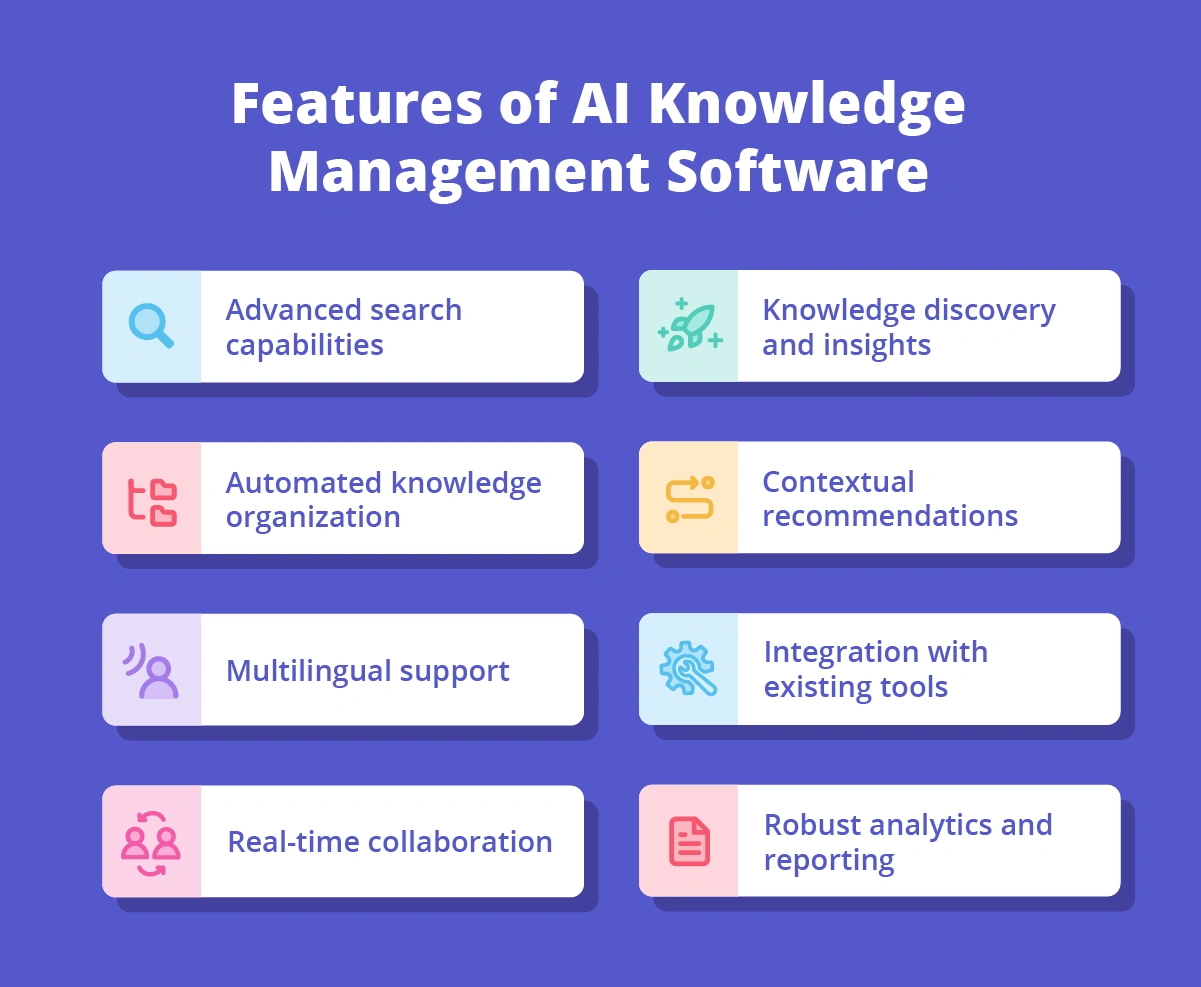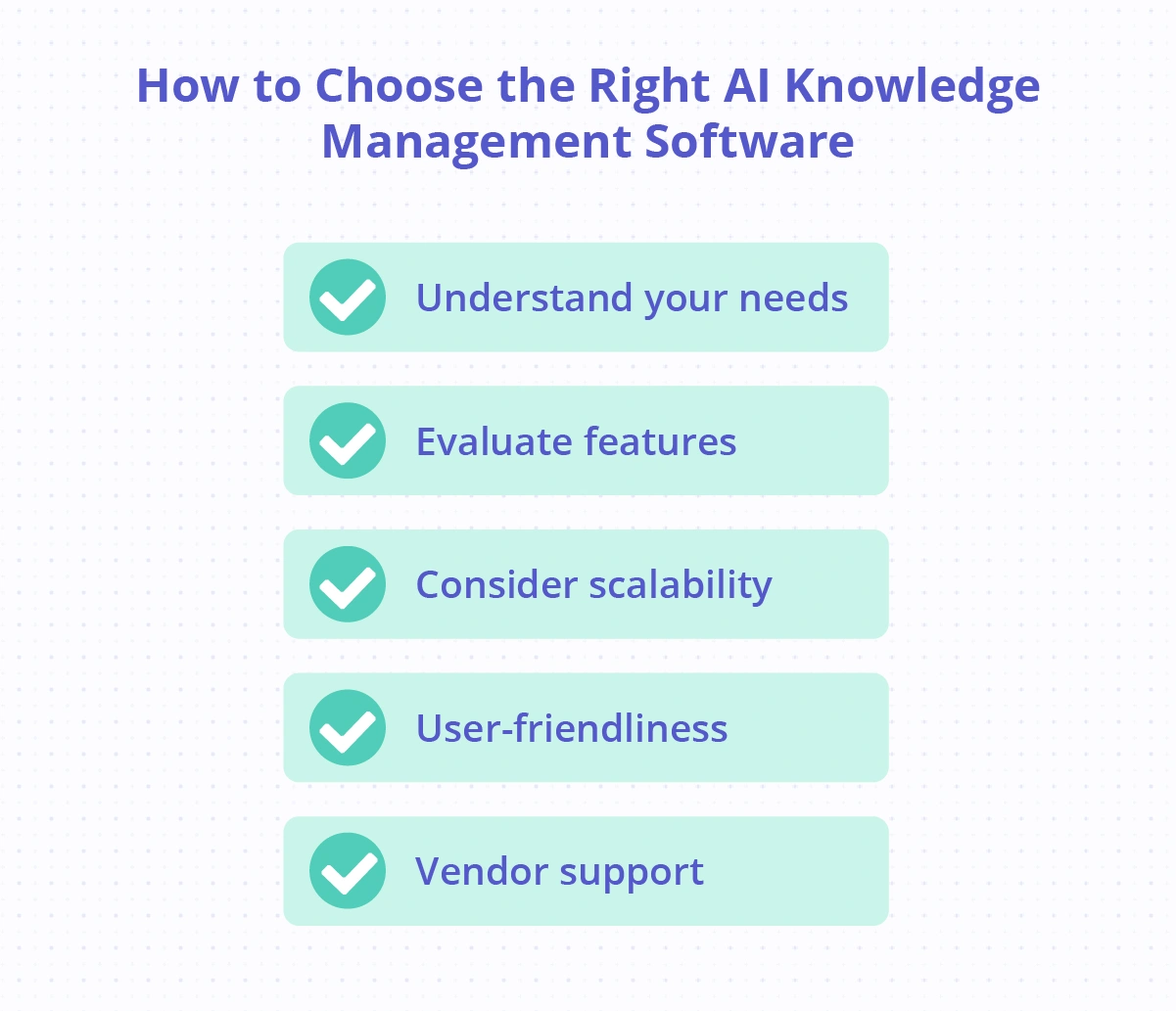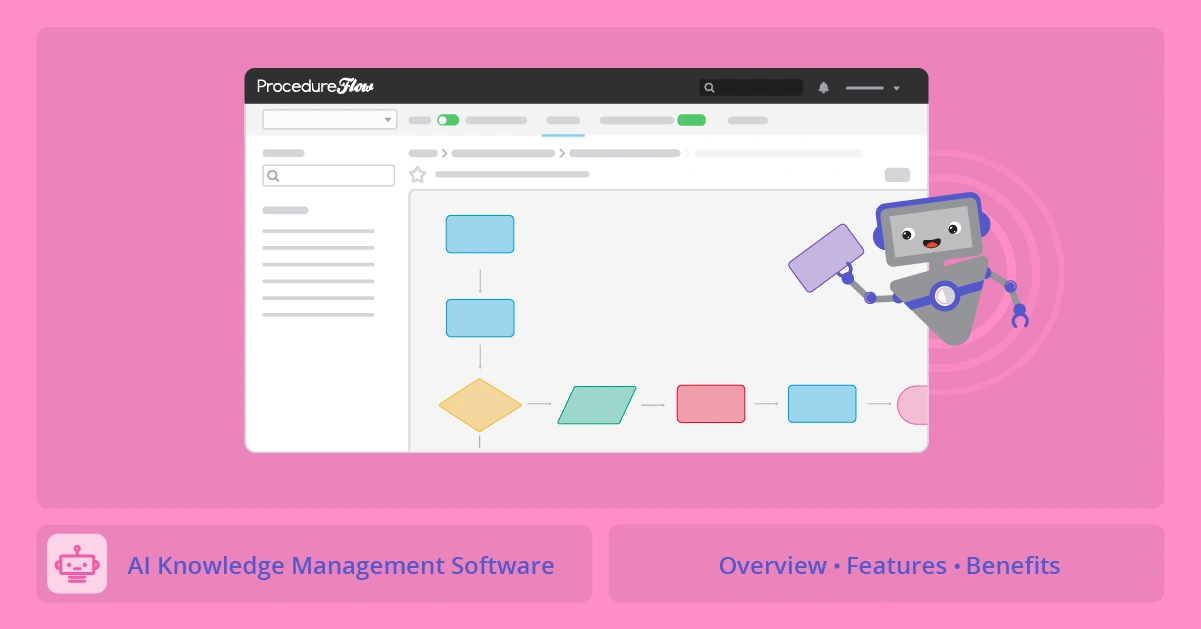In today’s fast-paced digital world, knowledge is one of the most valuable assets an organization can have. That’s why 27% of knowledge management teams state their priority is to incorporate AI. However, managing, organizing, and utilizing this wealth of information effectively is no easy task, especially without a solid knowledge governance strategy. This is where AI knowledge management software steps in, improving the way businesses handle and leverage their intellectual assets.
This blog explores the concept of AI knowledge management software, its benefits, key features to look for, and tips for choosing the right software.
What is AI knowledge management software?
AI knowledge management software integrates artificial intelligence to collect, organize, analyze, and distribute knowledge within an organization. Unlike traditional knowledge management tools, AI-powered solutions are capable of learning patterns, automating workflows, and providing intelligent recommendations, thus enhancing productivity and operational efficiency.
38% of knowledge management teams believe AI to recommend content or knowledge assets is an essential technology. AI technologies such as machine learning, natural language processing (NLP), and predictive analytics are at the core of these systems. They enable capabilities like understanding context, automating repetitive tasks, and uncovering insights from vast repositories of unstructured and structured data.
Key features of AI Knowledge management software
Advanced search capabilities
AI-powered knowledge management software revolutionizes search by enabling semantic search, allowing users to retrieve information using natural language rather than exact keywords. Features like auto-completion and intent recognition further refine search results, saving time and improving accuracy. Ranked results prioritize the most relevant information, ensuring users quickly find what they need. This capability is especially useful for navigating large knowledge bases, reducing frustration, and boosting productivity across teams.
Knowledge discovery and insights
AI algorithms analyze vast data repositories to uncover trends, patterns, and gaps in organizational knowledge. By identifying these insights, businesses can make informed strategic decisions, optimize processes, and address inefficiencies. For instance, AI can detect frequently asked questions or emerging topics, prompting the creation of new resources. This discovery capability transforms raw data into actionable intelligence, driving innovation and operational excellence.
Automated knowledge organization
AI automates the categorization, tagging, and indexing of information, significantly reducing manual efforts. This ensures that data is organized consistently and accurately across the system. By streamlining the organization of resources, employees can quickly locate relevant content, minimizing time wasted searching for information. Automation also allows the knowledge base to scale effortlessly as the volume of data grows.
Contextual recommendations
AI uses machine learning to analyze user behavior and historical data, providing tailored suggestions for documents, resources, or experts. For example, if an employee frequently accesses customer support documentation, the system might recommend related training materials or process updates. This personalization improves workflow efficiency, enhances learning, and ensures users always have access to the most relevant information.
Multilingual support
Natural language processing (NLP) enables AI knowledge management software to understand and manage multilingual content. This feature is invaluable for global organizations, allowing seamless collaboration and communication across language barriers. AI can translate, organize, and retrieve knowledge in multiple languages, ensuring inclusivity and accessibility for diverse teams.
Integration with existing tools
AI knowledge management systems integrate seamlessly with CRMs, ERPs, and collaboration platforms, creating a unified knowledge ecosystem. This compatibility ensures smooth workflows, as employees can access knowledge directly within the tools they use daily. Such integration reduces friction, speeds up adoption, and enhances productivity by eliminating the need to switch between systems.
Real-time collaboration
AI fosters real-time collaboration by identifying common questions, automating workflows, and ensuring that all team members access updated information. Shared workspaces, instant notifications, and AI-driven insights keep teams aligned and efficient. This feature is particularly valuable for remote and hybrid teams, enabling seamless coordination and knowledge sharing.
Robust analytics and reporting
AI-powered dashboards and visualizations provide managers with deep insights into knowledge usage, helping them track performance, identify bottlenecks, and measure ROI. Analytics reveal patterns such as frequently accessed documents or underutilized resources, guiding optimization efforts. By leveraging these insights, organizations can continuously improve their knowledge management strategies.

Top benefits of AI knowledge management software
AI-driven knowledge management offers a multitude of benefits that traditional methods cannot match.
Enhanced productivity
AI knowledge management software boosts productivity by eliminating the time employees spend searching for information. Advanced semantic search capabilities quickly surface the most relevant data, while personalized recommendations streamline workflows. This ensures tasks are completed faster, enabling employees to focus on more strategic activities. By automating repetitive knowledge organization tasks, AI reduces administrative burdens, further enhancing overall efficiency.
Improved decision-making
AI systems analyze complex datasets and generate actionable insights, empowering leaders to make data-driven decisions with confidence. Predictive analytics helps forecast trends, identify risks, and uncover opportunities, enabling proactive strategies. This level of intelligence improves decision-making accuracy, ultimately driving better business outcomes. AI also highlights overlooked patterns, fostering innovation and informed problem-solving.
Cost efficiency
AI knowledge management tools save costs by automating repetitive tasks like data organization and retrieval, reducing reliance on manual processes. They help eliminate inefficiencies caused by knowledge silos, ensuring information is reused effectively across teams. These efficiencies, combined with the ability to scale without significant additional investment, result in significant cost savings for organizations over time.
Better customer experience
Customer-facing teams benefit from AI by accessing accurate and up-to-date information instantly. Whether responding to queries or resolving issues, AI-powered tools ensure seamless and efficient support, leading to faster resolution times. Enhanced self-service options, such as intelligent FAQs and chatbots, further improve the customer experience, boosting satisfaction and loyalty.
Scalability
AI knowledge management software scales effortlessly with organizational growth. It handles increasing volumes of data and accommodates more users without compromising performance. As businesses expand, AI systems adapt to their evolving needs, maintaining consistent efficiency. This scalability makes AI tools an ideal long-term solution for organizations of all sizes.
Retention of institutional knowledge
AI preserves organizational knowledge by centralizing and updating information in real time. This ensures that valuable expertise and insights remain accessible, even as employees leave or transition roles. By preventing knowledge loss, businesses maintain continuity and reduce the need for extensive retraining or rework, securing a competitive advantage.
Cross-departmental collaboration
AI bridges gaps between departments by centralizing information and making it accessible across teams. It identifies overlapping needs, shared challenges, or common questions, encouraging collaboration. By breaking down silos, AI fosters innovation and alignment, ensuring that all teams work together effectively toward organizational goals.
How to choose the right AI knowledge management software
Understand your needs
Begin by assessing your organization’s challenges and knowledge management gaps. Identify specific pain points such as inefficient information retrieval, siloed data, or high employee turnover. Set clear objectives, such as improving collaboration, automating repetitive tasks, and establishing a knowledge governance framework, to align the software’s capabilities with your business goals and ensure maximum ROI.
Evaluate features
Examine the software’s core features to ensure it meets your requirements. Prioritize tools with semantic search, automation, contextual recommendations, and robust analytics. These capabilities streamline workflows and enhance decision-making. A feature-rich platform is essential for effectively managing your organization’s knowledge and adapting to evolving business needs.
Consider scalability
Choose a platform that can grow alongside your organization. Ensure it can manage increasing data volumes, users, and integration needs without sacrificing performance. Scalable AI knowledge management software provides long-term value by accommodating expansion and ensuring consistent efficiency as your business evolves.
Ease of integration
Opt for software that integrates seamlessly with your existing tools and platforms, such as CRMs, ERPs, and collaboration systems. Smooth integration minimizes disruption during implementation and enables employees to access knowledge within familiar environments, enhancing productivity and ensuring widespread adoption.
User-friendliness
A user-friendly interface is critical for successful implementation and adoption. Look for intuitive navigation, minimal learning curves, and accessible features. A well-designed platform encourages employees to engage with the system regularly, maximizing its impact on productivity and collaboration.
Vendor support
Partner with a vendor known for reliable customer support and ongoing innovation. Evaluate their track record in providing updates, addressing concerns promptly, and offering training or onboarding assistance. Strong vendor support ensures your organization can fully leverage the software’s capabilities and adapt to future challenges.

AI knowledge management software challenges and future trends
While AI knowledge management software offers numerous benefits, it comes with challenges such as data privacy concerns, upfront costs, and the need for employee training. However, advancements in AI are continuously addressing these issues.
Challenges
High implementation costs
Deploying AI knowledge management software often involves significant upfront investment, including licensing, infrastructure upgrades, and training. Organizations need to weigh these costs against potential long-term benefits, ensuring they allocate sufficient budget and resources for a successful rollout.
Data privacy and security concerns
AI systems process large volumes of sensitive data, raising concerns about privacy and compliance. Organizations must implement robust security measures and ensure the software adheres to data protection regulations like GDPR or CCPA to safeguard information.
Employee resistance and training
Adopting AI knowledge management software can face resistance due to fear of automation or unfamiliarity with new technology. Comprehensive training and clear communication about the benefits are essential to overcome this challenge and drive user adoption.
Future trends
Generative AI integration
Generative AI models like ChatGPT are being integrated into knowledge management tools to create dynamic content, generate personalized recommendations, and handle complex user queries, providing a more interactive and adaptive experience.
Voice and conversational interfaces
The rise of voice recognition and conversational AI will allow users to interact with knowledge systems more naturally. Voice commands and chatbots will simplify access to information, making workflows faster and more intuitive.
Hyper-personalization
Future AI systems will leverage advanced machine learning to deliver hyper-personalized recommendations and insights. These tools will analyze user behavior and preferences to provide tailored knowledge and guidance, improving engagement and productivity.
Getting started with AI knowledge management software
AI knowledge management software is not just a trend—it’s the future of how organizations manage and leverage their intellectual assets. By automating processes, delivering actionable insights, and fostering collaboration, these tools empower businesses to thrive in a knowledge-driven economy. No matter which industry you’re in, investing in the right AI-powered solution can transform your operations and set you ahead of the competition.
View our integrations page to learn more about how AI knowledge management software can unlock the full potential of your organization’s knowledge ecosystem.



